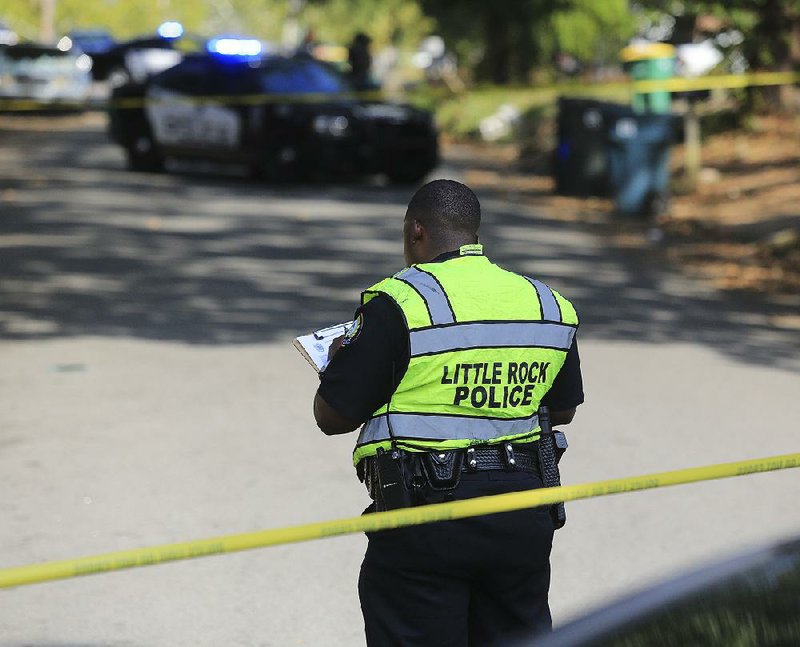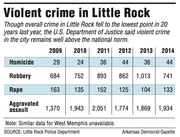The U.S. Department of Justice on Monday named Little Rock and West Memphis as participants in a federal program aimed at reducing violent crime in certain cities.
The federal Violence Reduction Network provides training, technical assistance and access to federal resources to "communities with violence levels that far exceed the national average," according to the department. Little Rock and West Memphis were selected this year along with Compton, Calif.; Flint, Mich.; and Newark, N.J., to join the two-year program.
The program is free to the cities, which will participate in quarterly meetings with Justice Department officials and have been assigned an interagency liaison. According to the department, the Violence Reduction Network also helps local agencies evaluate strategies on fugitive apprehension, drug trafficking and gang intervention.
Little Rock Police Chief Kenton Buckner said the state's largest police force is specifically seeking to reduce aggravated assault and domestic violence in the capital city. Overall crime in Little Rock fell to its lowest point in 20 years in 2014 and has continued falling this year, but police have reported an increase in aggravated-assault cases.
"What they do for us is they become the bridge between us and what's considered best practices for some of the areas that are having challenges," Buckner said of the federal program. "For example, if there's a city that's having some success with domestic violence, they will pay for us to either send our commanders to that city or pay to bring those commanders to Little Rock, and then to teach us what kind of things that they're doing so we can develop a Little Rock model based upon those pillars."
Buckner said the department will also seek guidance on applying for federal grants. The Violence Reduction Network offers training on how to pursue such funds.
West Memphis police spokesman Capt. Ken Mitchell hadn't returned calls seeking comment Monday.
Buckner, West Memphis Police Chief Donald Oakes and U.S. Attorney for the Eastern District of Arkansas Chris Thyer were in Detroit on Monday attending a week-long meeting of law enforcement officials involved in the program.
They joined officials from Detroit; Chicago; Camden N.J.; Wilmington, Del.; and the neighboring California cities of Oakland and Richmond, which were selected last year as the program's first participants.
As part of the program, cities have integrated local law enforcement efforts with federal intelligence networks on firearms and drugs; trained in the use of social media and other technology as investigative tools; expanded youth employment and mentorship programs; expanded criminal analytics programs; and trained in fair, impartial police practices.
Wilmington police reportedly tripled its clearance rate in homicide cases.
Oakland and Richmond, in collaboration with the U.S. Marshals Service, reportedly apprehended more than 120 fugitives and 12 homicide suspects.
In a statement, Assistant U.S. Attorney General for the Office of Justice Programs Karol Mason said the Justice Department is "putting its full support behind Little Rock and the other cities that are part of the Violence Reduction Network."
"While there is often a tendency to focus on on their per capita crime rates, Little Rock and the other cities were selected to join the [program] first and foremost because of city leaders' commitment -- like Chief Buckner's -- to partnering with us at the Justice Department," Mason said.
An Arkansas Democrat-Gazette analysis of crime statistics earlier this year found Little Rock, in recent years, had significantly higher reports of violent crime than the four American cities closest to it in population.
Those cities -- Akron, Ohio; Fayetteville, N.C.; Amarillo, Texas; and Columbus, Ga. -- each logged at least 49 percent fewer aggravated assaults, 45 percent fewer homicides and 36 percent fewer robberies than Little Rock between 2009 and 2013, according to data the cities voluntarily reported for the FBI's annual Uniform Crime Report.
Akron was the only city to report more rapes than Little Rock in that time.
Little Rock Mayor Mark Stodola, a former prosecutor, noted that overall crime in Little Rock has continued falling this year, but said there's "certainly always room for continued improvement." He said he welcomes assistance from the Department of Justice.
Stodola cautioned that crime statistics don't always tell the whole story.
"The jails and the penitentiaries being full is kind of a direct correlation between these numbers and the position that the capital city is being put in. ... What I'm saying is part of what drives the numbers is the fact that the jails and prisons are full, and they're releasing people who would otherwise be confined," he said.
Stodola also said the greater part of violent crime in the city is not random.
Of the 44 homicides in Little Rock last year, police classified 37 as "domestic" or "victim known to suspect."
"Numbers mean a lot of different things to a lot of different people. Certainly the violence numbers and their relationship per capita is an important issue, and I'm glad we're making progress on that," Stodola said.
Crime data for West Memphis weren't available in the FBI reports. The city of 24,000 is included in a nine-county region classified as the Memphis metropolitan area.
Arkansas Sen. John Boozman had discussed Little Rock and West Memphis as candidates for the Violence Reduction Network at a U.S. Senate subcommittee hearing in March.
At the hearing, U.S. Bureau of Alcohol, Tobacco, Firearms and Explosives Director B. Todd Jones said crime in the cities had already caught the agency's attention.
"I know that Little Rock, West Memphis -- Little Rock, in particular, has been discussed not only as a [Violence Reduction Network] potential site, but as a site that we'd done some work through our New Orleans field division to try and address the unacceptable levels, at times, of violent crime," Jones said.
Boozman, in a statement Monday, said he supported the cities' inclusion in the program.
"It should prove to be a vitally important component in the efforts to enhance public safety in Little Rock and West Memphis," he said.
Buckner said he was defensive, at first, when the Justice Department contacted Little Rock about joining the program.
"When you think about it, who wants to be on a list where you're considered one of the most violent or dangerous cities in the country? No one wants to be on that, and you feel defensive about it because you love your city," he said, noting that cities are not required to join the program.
"But after you set your ego aside and see what they're willing to do for you -- and that they're willing to pick up the cost for it -- anyone in their right mind would be a fool not to participate in something like this."
Nationwide, violent crime has fallen 51 percent, and property crime 43 percent since 1991, according to federal research.
Buckner said that members of minority groups remain the most affected by crime in Little Rock.
"Our crime is in pockets of saturated areas. Common denominators for those areas are poverty, high unemployment, low academic achievement, single-parent homes, absentee fathers, substance abuse, mental illness -- those are some of the common denominators that make up those areas," he said. "And there's a lot of great people that live in those communities. There are high concentrations of those socioeconomical elements that we think are a precursor to violent crime."
Metro on 09/29/2015

